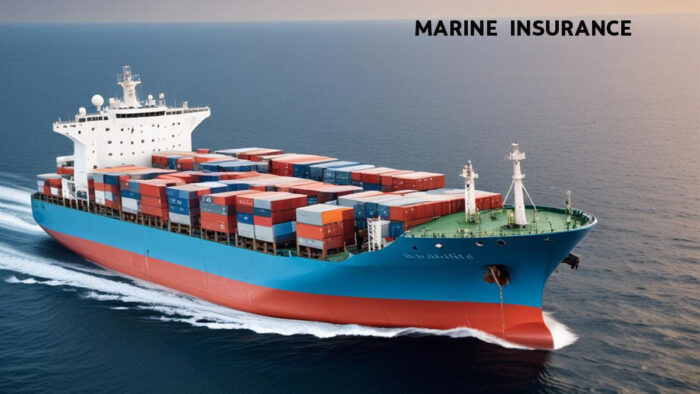The basic goal of marine insurance is to protect policyholders against financial and asset ruin when they are traveling by water.

Perhaps, if you are an individual who specializes in international trade, getting marine insurance is the best option. It guarantees peace of mind and financial security in hard times.
We are going to be exploring the intricacies of marine coverage, enlightening our readers on what it entails, its benefits, types, coverage options, and other valuable information.
What is Marine Insurance?
Marine insurance is a type of insurance that covers the loss or damages of goods on ships, cargo, and terminals either on water or land during transit.
If you deal with international trade and there are damages incurred during the process of transiting your goods, marine insurance will cover all related expenses. If there’s a collision, fire, or damage caused by sinking or other natural causes, it will cover the expenses.
How Does Marine Insurance Works?
Working in the marine industry exposes one to a lot of risks, and getting marine insurance is one of the wisest decisions anyone would make.
Those who purchase marine coverage get covered for any liability or damage incurred from fatal events that occurred on water. When you purchase coverage under marine insurance, it automatically transfers all liability to your insurance provider.
As an exporter or international trader, you are expected to carry marine insurance in order to protect your customers’ interests. This enhances a level of trust from your customer, knowing fully well that their goods are adequately covered.
In the event of a loss or damage, policyholders should reach out to their insurance provider, who will assign a surveyor to assess the extent of the damage.
In addition, this type of insurance mandates issuing agreed-value policies. This agreed value is concluded between the policyholder and the insurance company, except if there is an occurrence of fraud.
Types of marine Insurance
• Liability insurance
This coverage protects the ships in the event of a collision, crash, or attack that results in severe damage or loss. Liability insurance will protect against these categories of risk. In most cases, policyholders will be compensated for any form of damage that is beyond their control.
• Marine cargo insurance
This type of coverage handles the loss or damage caused to the cargo in the process of traveling to another destination. Marine cargo insurance also covers damage caused by delays in unloading or ship accidents. If you have heavy cargo shipments, this type of coverage will help protect the entire ship.
• Marine hull insurance
This type of marine insurance covers the vessel, furniture, and other items on the haul. We advise shipowners to include this in their insurance policy.
• Machinery insurance
This type of coverage protects all essential machinery on the ship in the event of an accident. However, it is important to note that damaged machinery will undergo analysis by the surveyor before claim approval.
• Freight insurance
This is also another type of marine coverage that ship owners can add to their policy. Freight insurance is a policy placed by a third-party company in order to ensure protection for your cargo. This is an exclusive policy made available to the shipper and the specific freight shipment.
Beyond the types of marine insurance we have mentioned, there are other types of policies you can include as part of your coverage. You can reach out to your insurance company for information about other types of insurance available to you.
What Does Marine Insurance Cover?
It covers a wide range of risks, such as:
- Loss or damage to goods while in transit.
- Loss of freight revenue.
- Damage and loss caused by war-related perils such as terrorism, strikes, or riots.
- Loss of income during repair or recovery periods.
- Damage to machinery and equipment on the ship.
- It also provides coverage for legal liabilities such as injury, environmental pollution, or the death of crew members.
Policyholders can customize their insurance policy to their preferred tastes and needs. This is to ensure that the coverage option is tailored to meet the specific risk associated with the daily operation of your ship.
It is important for policyholders to work closely with their insurance provider to ensure quality and comprehensive protection against a wide range of sea risks.
What Does It Not Cover?
While marine coverage offers protection for a myriad of risks and losses, there are limitations to what it covers. It will not cover
- Intentional damage or damage from a delay.
- Damage due to negligence on the part of the policyholder.
- Damage from biochemical, biological, or chemical reactions.
- Common leakages or regular wear and tear.
- Ruin or misplacement caused by inappropriate packing.
- Financial default or bankruptcy on the part of the policyholder.
Factors That Influence the Cost of Marine Insurance
There are quite a number of factors that determine the cost of your marine insurance policy, such as:
- Value of the cargo.
- Condition of the cargo.
- The route of the shipping vessel.
- Claim history of the company.
The cost is not just limited to these factors alone. There are other things that may influence the cost of getting marine insurance. It depends on the insurance provider and the type of perils you seek protection for.
Marine insurance provides financial stability to businesses in the event of an accident that could result in damage or loss. Getting it enables you to manage the risks that come with the daily operation of your business.
The fascinating part of it is that you can choose from and customize your policy according to your budget and needs. All in all, marine coverage provides you with the opportunity to create wealth for your future goals.



